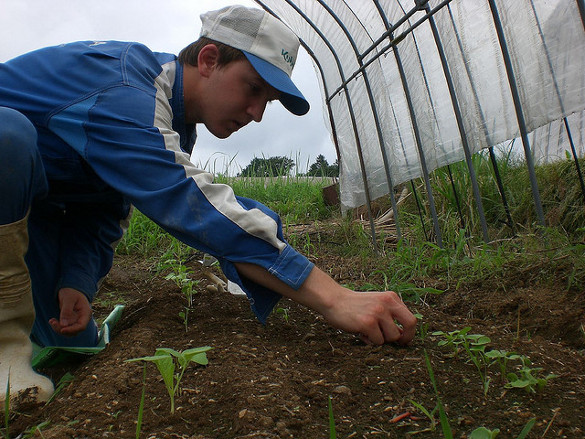If you have aspirations of long-term travel but can’t seem to save the coin necessary to not work for an extended period of time, have you thought about working while traveling?
Here are 11 FAQ’s about working on the road in an effort to travel longer.
- Can it be done?
- What Type Of Work Can I Do On The Road?
- I Is No Good At English. What Else Can I Do?
- I’ve Heard About Working “Under The Table.” What’s That About?
- What About Working In Hostels? Is That Possible?
- That Doesn’t Sound Like Much Fun. What’s With This WWOOF’ing Thing I keep Hearing About?
- What Is Location Independence?
- How Can I Be A Location Independent Professional?
- Are There Any Jobs That Lend Themselves To Becoming A Digital Nomad?
- What Are The Benefits Of Being Location Independent?
- What Are The Downsides Of Being Location Independent?
- What about travel blogging?
Can it be done?
Yes, it definitely can be done, and the landscape is constantly changing for work abroad options. This is a huge subject, and there has been a lot written about it including:
- Various threads on our message boards
- A feature article highlighting 12 of the Best Jobs that Combine Work and Travel.
There are tons of different options for working while you are traveling. This can extend your trip or just give you a higher budget to work with. Plus you get the opportunity to live in and experience a new culture.
What type of work can I do on the road?
Many people set out on long-term travel and then stop in one place for a long time while working there. Teaching English as a foreign language (TEFL/ESL) is the most common job one can acquire in a foreign country (provided you’re a native English speaker). Many travelers are spread out all over the world doing it right now. Some stay in a place for a few months and others spend years in one place.

I is no good at English and doesn’t like kids. What else can I do?
Many long-term travelers are more interested in picking up a bit of work for a couple days up to a couple of months in order to fund the next segment of their journey. If you are between the ages of 18 and 25 (or 30 in some cases), there are programs set up where you can get temporary jobs in certain countries with certain restrictions. Citizens of Commonwealth countries like the UK, Canada, Australia, and New Zealand have it easier working in other member nations. There are programs set up Americans can take advantage of, but they are more limited.
I’ve heard about working “under the table.” What’s that about?
Many people don’t want to bother with any official and restricted program. In some areas it’s not too difficult to get temporary work “off the books.” The most popular jobs in this form are as bartenders and waiting tables. If you’ve got experience at this back home you might be able to find a place that will take you on temporarily for off-the-books cash payment. Most bars and restaurants maintain a stable local staff, but finding places that will employ travelers is not impossible if you look around. Irish pubs in any city are usually a great source of information if not for actual jobs themselves.
What about working in hostels? Is that possible?
Absolutely! It’s a great opportunity for travelers. Quite a few hostels will employ travelers as a major part of their day-to-day staffing. This sort of work is not too difficult to get, but the pay tends to be a certain number of hours in exchange for a free dorm bed and often meals. This can help cut the cost of staying in one place for a while, but obviously won’t be much help in saving up money for future exploits.
What about this WWOOFing thing I keep hearing about?

WWOOF (World Wide Opportunities on Organic Farms) is another way to stem the flow of outgoing cash. In return for volunteering to work on an organic farm, you will receive room and board. You won’t be making any money, but you won’t be spending a whole lot either. It’s also a great way to meet people and experience a part of a country definitely off-the-beaten-path. Opportunities exist worldwide.
While these are all great ways to make a few extra bucks on the road, if you want to make a real living while also living or traveling abroad, you may want to look at becoming a location independent professional.
What exactly is location independence?

Location independence is the idea that you can work and live from anywhere, thanks to modern technology that allows you to stay connected to colleagues, employers, employees, and clients whether you are in the next cubical or around the world. Location independent professionals can work full or part time, run their own business, or work as a freelancer or contractor. They may live in one place for a year, a few months, or just a few weeks, mixing days or hours of work with time off to enjoy the location they are visiting.
How can I be a location independent professional?
Take a look at the duties of your current job. How much face time with your co-workers and clients is really required? What kinds of tasks could you be doing from home right now, even if you were still in the same city? If most of your tasks could be done remotely, you are a good candidate for becoming location independent in your current job. If most, but not all functions could be done from anywhere, maybe you could tweak your job description to shift the tasks that must be done from the central office to another person. Obviously you’d need a really good track record at your job to be able to pull this off.
Are there jobs that lend themselves to becoming a digital nomad?
Anything that you can do with only your computer and an internet connection is best. Web consultants, writers, photographers, web developers, even lawyers and other business professionals can offer consultations from anywhere in the world. While there may be a good deal of jobs that are good for digital nomads, finding them is the real challenge. But if you were already planning a RTW trip without having to work, maybe you can start some other work on the side while you’re gone and begin to build a business?
What are the benefits of being location independent?
The biggest benefit of being a location independent professional is that you can travel and live almost anywhere you like and still make money while you do. You don’t have to give up your career in order to travel long-term and you’ll gain new skills that will make you even more attractive to future employers. There won’t be a gap on your resume, so you don’t have to worry that traveling for a year or two will negatively affect your career path.
What are the downsides of being location independent?

There are a few downsides to being location independent rather than just taking off to travel around the world for a set amount of time. Rather than being free to do what you want every day, you’ll have to commit to spending at least a few hours of each day or week working. Your time may not be entirely your own as you may be working under tight deadlines. You may also have to be available at inconvenient times of the day so that you can check in via phone or Skype with clients or co-workers. And, since some of your time will be taken up with work hours, you’ll have less time to explore each area. For this reason, many location independent professionals choose to stay longer in each place and see fewer places overall.
What about travel blogging?
Travel blogging has become a popular way to be able to travel and make a few bucks while doing it. However, there are LOTS of misconceptions on how to do this. Don’t assume that you’re going to start a blog and be able to start monetizing it right away – it’s extremely hard work, and many bloggers who do this as a career now spent years building an audience and writing for free before they started bringing in any type of income. Not trying to burst your bubble, but like any other business, travel blogging takes a lot of hard work and commitment. If you want to make this happen, start learning about the business right now and get to work.
If you’re looking for a way to get started blogging, or you simply want new, fresh ideas to write about, then check out our 30 Days of Indie Travel Art Project, starting April 1, 2014.
Return to FAQ Home